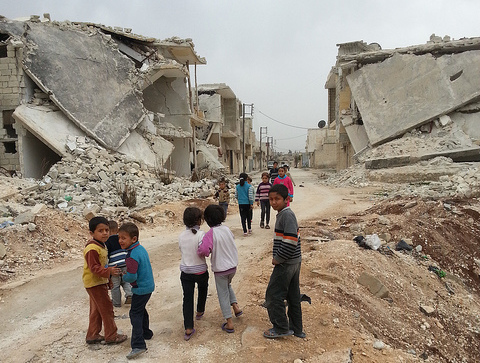On 27 April, the UN Security Council held an open debate on “Critical Infrastructure: The Protection of Objects Indispensable to the Survival of the Civilian Population” under its protection of civilians agenda. The focus was an important one: with conflicts increasingly fought in urban centres and other populated areas, civilian infrastructure is subject to devastating attacks that can affect the lives of civilians for decades after. The debate’s resulting resolution 2573 highlights the extensive humanitarian impact of the destruction of critical civilian infrastructure and calls for their better protection.
With more civilians dying from indirect effects of armed conflict—for example, food insecurity, malnutrition, unmet medical needs, lack of access to safe water and sanitation, or contamination of water—than from violence, the resolution emphasised that “ongoing armed conflicts have devastating impacts on civilians… and on objects indispensable to the survival of the civilian population, exacerbate existing socio-economic fragilities and vulnerabilities, overstretch limited resources, resulting in reduced access to essential services such as health care, water, sanitation, energy, posing devastating consequences for the civilian population, and hindering an effective humanitarian response”. The resolution also recognised “ the interconnectedness of certain essential services, as well as the vulnerabilities of objects indispensable to the survival of the civilian population that can be damaged in situations of armed conflict.

Children in Azaz, Aleppo governorate in Syria (© IHH Humanitarian Relief Fondation https://flic.kr/p/mC9de1)
INEW and other organisations, including the ICRC, has extensively documented how explosive weapons in particular can damage essential civilian infrastructure and, after extensive or extended use, completely devastate towns and cities, leaving large swaths uninhabitable. The destruction of housing, health facilities, schools, markets, roads and transport links, and utilities such as power, water and sanitation, extends and compounds the suffering for affected populations. Where explosive weapons damage infrastructure critical to the provision of power, water and sanitation, it causes further harm, cutting off services that depend on these capacities. Referred to as ‘reverberating effects’, the damage caused by explosive weapons can propagate through the interconnected and interdependent infrastructures that support civilian populations. In the short term, the impact of explosive weapons on buildings, places of commerce and transport routes can deprive civilians of their basic needs such as access to healthcare, clean water, electricity, food and shelter, which serves as a further driver of displacement. In the longer term, it can undermine local and national capacity for production and growth, and thereby people’s livelihoods and the broader state economy.
This impact was noted in the ICRC statement to the meeting, which emphasised that “[w]hen war moves to cities and other populated areas, where civilians and combatants, civilian objects and military objectives, are intermingled the risk of critical civilian infrastructure being damaged or destroyed is multiplied, especially when explosive weapons with wide area effects are used” and called on states to adopt “an ‘avoidance policy’ regarding the use of heavy explosive weapons in populated areas”. In his comments to the Security Council, the Under Secretary-General for Humanitarian Affairs similarly called for parties to conflict to “avoid the use of explosive weapons with wide-area effects in populated areas” due to the “devastating toll on essential infrastructure and services”. Citing the example of Yemen, he recalled that “the use of heavy explosive weapons in populated areas has disrupted every resource and system in the country, including water and power supplies, hospitals and sanitation systems”.
People subject to the effects of explosive weapons, including damage to and destruction of critical infrastructure, in the towns and the cities where they are trying to live their lives deserve an ambitious international response. States are in the process of negotiating a political declaration that would contain new international standards on the use of explosive weapons in populated areas, under the leadership of Ireland. In line with the UN Secretary-General and the ICRC, INEW is calling upon states to include a commitment in this declaration to avoid use of explosive weapons with wide area effects in populated areas, as well as firm commitments to assist victims.
